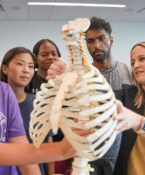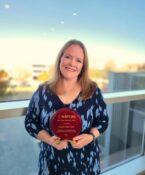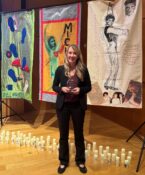SPH/TCOM’s Maria Nguyen to present Viet-American Health Pilot Study to national audience
 A dual-degree student at The University of North Texas Health Science Center at Fort Worth is taking an important step toward addressing health disparities in one local community.
A dual-degree student at The University of North Texas Health Science Center at Fort Worth is taking an important step toward addressing health disparities in one local community.
Maria Nguyen, who is a student at HSC’s School of Public Health and Texas College of Osteopathic Medicine, will be presenting a poster during the Diversity in Medicine Conference on Saturday, March 11 at the University of Michigan in Ann Arbor. She’ll be sharing some of the results of an ongoing Viet-American Health Pilot study funded by the National Institute of Minority Health and Health Disparities arm of the NIH.
Nguyen’s four-member team, led by Dr. Uyen-Sa Nguyen, an associate professor of epidemiology and biostatistics in the SPH, has been working for more than two years on a series of questionnaires aimed at determining barriers to health care in the North Texas Vietnamese population.
“Understanding the impact of health inequities among certain groups is a public health priority for addressing disparities in health outcomes,” said Shafik Dharamsi, dean of HSC’s School of Public Health. “We know that clinical research studies, for example, often do not represent our diverse population. As a result, certain patient populations are often excluded from efforts that can influence the risk of developing a disease, improve health outcomes, and improve responses to treatments. Dr. Nguyen’s work is critical to improving quality of life among groups that have been generally overlooked in research studies.”
Maria Nguyen, who is a first-generation American and the first in her family to attend college, said having immigrant parents who migrated to the U.S. after the Vietnam War gave her a unique perspective for this study.
That population, she said, “may not be seeking [traditional] health care as much because they’ve been through so much. A small illness or something may not be as significant as what they’ve been through in the past through the Vietnam War. We found that 95% of the participants that we recruited have health insurance, but a lot of them still focus on non-medical treatments, such as getting massages, going for walks, tai chi or acupuncture. That kind of goes into the Western versus Eastern philosophies of medicine.”
Three phases of the Viet-American Health study
The goal of the conference is to unite researchers from across the country to share their work on increasing diversity in medicine. Nguyen submitted an abstract detailing the preliminary findings of the SPH group’s work.
During the initial phase of the project, Nguyen’s group created and translated a 16-page questionnaire with the goal of gauging the local Vietnamese community’s awareness of medical conditions such as arthritis, the existence of comorbidities, and other health risk factors. The researchers formed a focus group to make sure the document was linguistically and dialectically understandable.
Once that questionnaire was deemed ready, the students recruited more than 250 participants through extensive outreach throughout North Texas to take the survey. After three months, the researcher followed up with people who answered their questions to determine if their situations had changed.
“Since we are medically underserved and there’s not a lot of studies done in Vietnamese American populations, we were hoping to use this as a pilot study for a larger study in the future — not just in the Dallas Fort Worth area, but Vietnamese Americans throughout Texas and maybe throughout the nation,” Nguyen said.
Last month, the group was excited to learn that the NIH approved a third phase of their work that Nguyen and her fellow researchers hope will extend the study over three years.
“We’re still trying to figure out some of these reasons why our community is so medically underserved,” she said. “Is it because of insurance? Is it because of their ideas or beliefs on how they take care of themselves? Their resiliency?
“We want to know their thoughts about the stigmas behind mental health. We want to know if they need help filling out medical forms in English. If we find some of these health care barriers, how can we raise awareness to educate them better?”
Addressing Viet-American health disparities is Nguyen’s calling
Nguyen is a Dallas native who grew up immersed in Vietnamese culture. She learned Vietnamese and English at the same time, attended a Vietnamese church, and was president of the Vietnamese Student Association during her undergraduate years.
She is on track to graduate in May.
“I felt like this was kind of my calling to help with addressing these disparities,” she said. “That’s kind of part of my long-term girls. I want to do medical mission trips and so hopefully going back to Vietnam and serve third-world populations. I’m involved a lot with rural health and global health at the medical school, so I felt like it was a good opportunity for me to be involved with this study.”





Social media